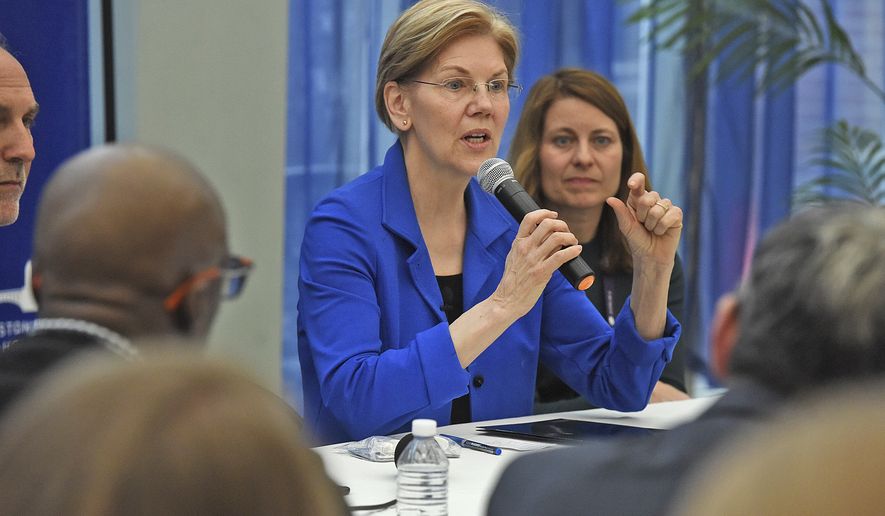Prominent Democrats raised the price tag Thursday on the country’s anti-opioid efforts, saying $100 billion will be needed to stem the scourge.
Sen. Elizabeth Warren of Massachusetts and Rep. Elijah Cummings of Maryland said the $1 billion doled out to states so far — the administration dispatched the second half of the money to states this week — is a fraction of what’s needed to rein in the prescription painkiller and heroin scourge.
They’re pushing bills that commit $100 billion to the problem over a 10-year period, saying Congress should follow the model it used during the HIV/AIDS epidemic three decades ago, when it helped fund both disease prevention and medical research.
“While states and communities on the front lines struggle to respond to the opioid crisis, Washington has only nibbled around the edges. It is past time for Congress to take real action,” Ms. Warren said.
President Trump and Congress are scrambling to get their arms around the opioid epidemic, which is killing 125 Americans per day.
The issue is a rare spot of bipartisanship in Washington, though funding has been a thorny issue in recent years, with Democrats calling on GOP leaders to devote more taxpayer resources to the fight.
Yngvild Olsen, medical director for the Institute for Behavior Resources in Baltimore, said pinpointing the actual price tag of the crisis is difficult — opioid addiction is complex, long-term and tied a number of other medical conditions.
Yet with some estimates putting the cost of the crisis at more than $500 billion a year, she said a long-term investment makes sense.
“The efforts from Sen. Warren and Rep. Cummings are very welcome, as we desperately need a robust, longer-term vision for funding effective solutions to the opioid epidemic,” she said.
The White House says it is focused on using what Congress has already approved.
“The White House made clear it needed $6 billion in the budget deal for its efforts combating the opioid crisis. We applaud Congress for delivering this request, and look forward to continuing discussions with the appropriators on the best distribution of the funding across multiple initiatives,” said Deputy White House Press Secretary Hogan Gidley.
Dr. Brett P. Giroir, a senior Health and Human Services Department adviser for opioids policy, told the Senate Finance Committee that states will see their first share of that money around September.
Separately, HHS dispatched a $485-million pool of funds to the states. It’s the second round of state grants tied to the 21st Century Cures Act, a measure President Obama signed during his final weeks in office.
Sen. Roy Blunt, Missouri Republican and top appropriator, said he expects Congress to vet how that money is being spent before even considering the type of levels envisioned by Ms. Warren.
“It’s certainly possible that over a 10-year period of time we could spend that much money, but I don’t know that it’s necessary to commit to that until we know a little more about where the money is best spent and how it’s best spent,” Mr. Blunt said.
Sen. John N. Kennedy, Louisiana Republican, did not dismiss Ms. Warren’s big-spending bill out of hand, saying it’s going to “take more than a couple of bucks” to tackle the crisis. But he’d like to see details.
“We’ve certainly got a problem. Now, how to solve it and best to target the money, I don’t know, but I’ll look at her bill,” he said.
Dubbed the CARE Act, the new bill would dole out $10 billion per year.
It sets aside $4 billion per year for states, territories and tribal governments, with hard-hit states getting half of the money. An additional $2.7 billion would go to counties and cities with high overdose rates, including a $270 million share for hard-hit American Indian tribes.
Efforts to track addiction and research better cures receive $1.8 billion under the bill, and there is $1 billion for innovative treatment projects and $500 million to expand the use of overdose-reversing naloxone.
“With bold investments in research and treatment, our federal government has tackled major public health crises before, and we must do it again,” Ms. Warren said.
Other lawmakers are pointing to non-financial assistance the government can offer.
Sen. Rob Portman, Ohio Republican, implored the Senate Finance Committee on Thursday to take up the STOP Act, a bill he authored to require foreign posts to send electronic data on packages it delivers through the U.S. mail.
Having that data before parcels arrive would help customs agents target and intercept packages that may contain deadly fentanyl from clandestine labs abroad. His bill would impose fees on foreign shippers for the privilege of sending their packages, so U.S. taxpayers don’t foot the bill for the effort.
• Tom Howell Jr. can be reached at thowell@washingtontimes.com.




Please read our comment policy before commenting.